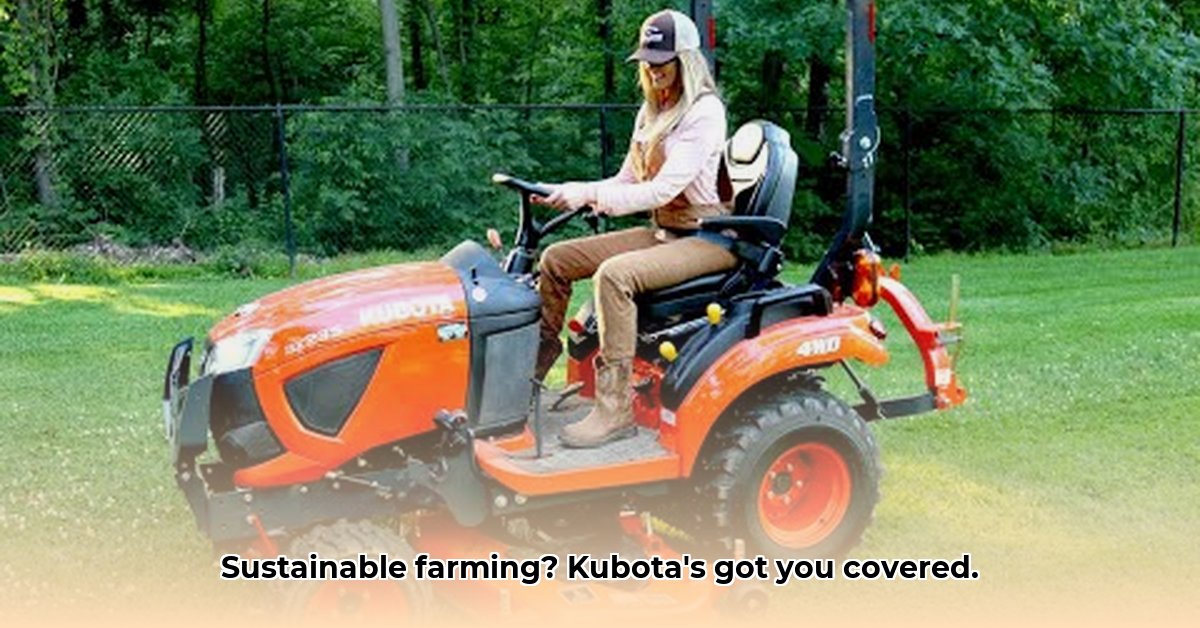
Kubota Tractor Mower Decks: A Sustainable Farming Investment
Kubota tractor mower decks represent more than just agricultural tools; they are a significant investment impacting both farm productivity and environmental sustainability. Selecting the right deck involves careful consideration of factors beyond initial cost, encompassing long-term durability, material sourcing, and end-of-life management. This analysis explores how Kubota mower decks contribute to sustainable farming practices and highlights key considerations for informed purchasing decisions. For great deals on Kubota tractors, check out these South Carolina deals.
Building a Sustainable Legacy: Durability and Reduced Environmental Impact
A durable Kubota mower deck is a cornerstone of sustainable farming. A high-quality deck, designed for longevity, significantly reduces the need for replacements. This translates to less waste in landfills, a decreased environmental footprint from manufacturing new equipment, and substantial cost savings over time. The reduction in the replacement cycle minimizes the overall carbon footprint associated with production and transportation. Kubota offers a range of deck sizes (48 to 60 inches), enabling farmers to select the optimal size for their needs – thus avoiding the unnecessary environmental burden of oversized equipment.
Isn't it crucial to consider the long-term impact when selecting farming equipment? A durable mower deck equates to less frequent replacements, reducing waste and saving you money in the long run.
Eco-Friendly Practices Beyond Mowing: Enhancing Soil Health
The positive environmental impact extends beyond the deck's lifespan. Mulching kits, available as accessories for many Kubota models, transform grass clippings into natural fertilizer. This reduces reliance on synthetic fertilizers, benefiting soil health and minimizing environmental harm. These organic fertilizers contribute to long-term soil vitality. Responsible disposal or recycling of components at the end of the mower's life cycle is equally crucial.
How can we ensure the most eco-friendly approach with our Kubota mower decks? Properly recycling or responsibly disposing of old components is a vital aspect of a genuinely sustainable farming operation.
Understanding the Complete Environmental Picture: The Need for Transparency
While the extended lifespan of a Kubota mower deck is advantageous, a comprehensive understanding of its total environmental impact is crucial. This includes a thorough examination of manufacturing processes, material sourcing, and end-of-life management. Currently, comprehensive data on these aspects is limited. A detailed life-cycle assessment (LCA) is needed to fully evaluate the environmental impact from raw material extraction to final disposal. This lack of readily available data presents a significant challenge to fully assessing the sustainability of these products.
Don't we need more complete information before making informed decisions about sustainable purchases? The absence of comprehensive LCA data hampers a thorough evaluation of Kubota mower decks' complete environmental footprint.
Collaborative Action: A Shared Responsibility for Sustainability
Achieving a truly sustainable agricultural landscape requires collective action. Stakeholders across the value chain must play a crucial role in promoting responsible practices:
| Stakeholder | Short-Term Actions | Long-Term Goals |
|---|---|---|
| Kubota & Manufacturers | Conduct thorough LCAs; research and develop sustainable materials; | Design for easy disassembly and recycling; implement closed-loop recycling systems; develop more energy-efficient manufacturing. |
| Farmers | Use appropriately sized decks; utilize mulching kits; responsibly recycle parts; | Advocate for government incentives for sustainable farming equipment. |
| Consumers | Prioritize durable equipment; consider total cost of ownership (including disposal); | Support companies committed to transparency and sustainability; actively inquire about manufacturers' sustainability efforts. |
| Government & Regulators | Set standards for sustainable farm equipment; establish programs for responsible disposal. | Implement policies encouraging sustainable resource management in agriculture; offer incentives for eco-friendly equipment. |
Mitigating Environmental Risks: Proactive Strategies
Several environmental risks are associated with the production and use of Kubota mower decks. Addressing these risks through strategic mitigation is essential.
| Risk Factor | Risk Level | Mitigation Strategy |
|---|---|---|
| Material Sourcing | Moderate | Use certified sustainable materials; increase recycled content. |
| Manufacturing Process | Moderate | Optimize energy efficiency; implement robust waste reduction strategies; explore renewable energy sources. |
| End-of-Life Management | Moderate | Develop comprehensive recycling programs; ensure responsible disposal methods are used. |
| Incomplete LCA Data | High | Conduct comprehensive LCAs to fully evaluate the environmental impact. |
| Fossil Fuel Reliance | Moderate | Explore and use alternative fuels (where feasible); improve factory energy efficiency. |
Choosing a Kubota tractor mower deck should involve more than just evaluating price and features. It's an opportunity to contribute to a more sustainable future. Demanding transparency and actively encouraging eco-friendly practices are vital to developing a truly sustainable agricultural landscape.